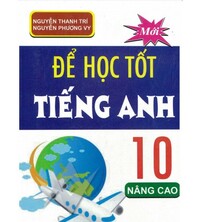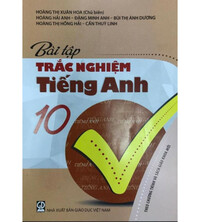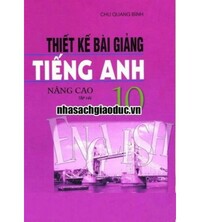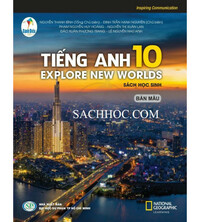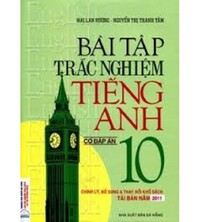Tiếng Anh 10 Unit 9 Looking back
Listen and mark the stressed syllables in the words in bold. Then practise saying the sentences with a natural rhythm. Choose the correct word to complete each sentence. Change the following sentences into reported speech.
Pronunciation
Pronunciation
Listen and mark the stressed syllables in the words in bold. Then practise saying the sentences with a natural rhythm.
(Nghe và đánh dấu các âm tiết được nhấn mạnh trong các từ được in đậm. Sau đó tập nói các câu với nhịp điệu tự nhiên.)
1. Don’t buy products that are made from wild animal parts.
2. What can we do to help the animals in the wild?
3. Larger tigers tend to live in colder areas while smaller tigers live in warmer countries.
4. Elephants are endangered because of illegal hunting ad body part trade.
5. Do you know why so many endangered animals are disappearing?
Phương pháp giải:
1. ˈDon’t ˈbuy ˈproducts that are ˈmade from ˈwild ˈanimal ˈparts.
(Không mua các sản phẩm làm từ các bộ phận của động vật hoang dã.)
2. ˈWhat can we ˈdo to ˈhelp the ˈanimals in the ˈwild?
(Chúng ta có thể làm gì để giúp đỡ các loài động vật trong tự nhiên?)
3. ˈLarger ˈtigers tend to ˈlive in ˈcolder ˈareas while ˈsmaller ˈtigers ˈlive in ˈwarmer ˈcountries.
(Những con hổ lớn hơn có xu hướng sống ở những vùng lạnh hơn trong khi những con hổ nhỏ hơn sống ở những nước ấm hơn.)
4. ˈElephants are enˈdangered because of ilˈlegal ˈhunting ad ˈbody ˈpart ˈtrade.
(Voi đang bị đe dọa vì nạn săn bắt trái phép buôn bán bộ phận cơ thể.)
5. Do you ˈknow why so many enˈdangered ˈanimals are disaˈppearing?
(Bạn có biết tại sao rất nhiều loài động vật có nguy cơ tuyệt chủng đang biến mất không?)
products /ˈprɒdʌkts/: (số nhiều) sản phẩm
animal/ˈænɪml/: động vật
Larger /ˈlɑːdʒə(r)/: (so sánh) lớn hơn
tigers /ˈtaɪɡə(r)z/: (số nhiều): con hổ
colder /kəʊldə(r)/: (so sánh) lạnh hơn
areas /ˈeəriəz/: (số nhiều) khu vực
smaller /ˈsmɔːlə(r)/: (so sánh) nhỏ hơn
warmer /ˈwɔːmə(r)/: (so sánh): ấm hơn
countries/ˈkʌntriz/: (số nhiều): những quốc gia
Elephants /ˈelɪfənts/: (số nhiều) những con voi
endangered /ɪnˈdeɪndʒəd/: gặp nguy hiểm, (động vật) có nguy cơ tuyệt chủng
illegal /ɪˈliːɡl/: bất hợp pháp
hunting /ˈhʌntɪŋ/: săn bắn
body/ˈbɒdi/: cơ thể
disappearing/ˌdɪsəˈpɪə(r)ɪŋ/: biến mất
Vocabulary
Vocabulary
Choose the correct word to complete each sentence.
(Chọn từ đúng để hoàn thành mỗi câu.)
1. Many wildlife habits / habitats will be destroyed if people keep cutting down the forests.
2. Researchers are looking for ways to reduce the environmental impact / affect of air pollution on the local community.
3. It’s illegal to kill pandas, tigers or any other dangerous / endangered animals.
4. Global warming / climate is mainly caused by pollution and clearing of forests.
Phương pháp giải:
habits: thói quen
habitats: môi trường sống
impact (n): sự tác động, ảnh hưởng
affect (v): tác động, ảnh hưởng
dangerous (adj): nguy hiểm
endangered (adj): gặp nguy, có nguy cơ tuyệt chủng
warming (adj): nóng lên
climate (n): khí hậu
Lời giải chi tiết:
|
1. habitats |
2. impact |
3. endangered |
4. warming |
1. Many wildlife habitats will be destroyed if people keep cutting down the forests.
(Nhiều môi trường sống của động vật hoang dã sẽ bị phá hủy nếu con người tiếp tục chặt phá rừng.)
2. Researchers are looking for ways to reduce the environmental impact of air pollution on the local community.
(Các nhà nghiên cứu đang tìm cách giảm thiểu tác động môi trường của ô nhiễm không khí đối với cộng đồng địa phương.)
3. It’s illegal to kill pandas, tigers or any other endangered animals.
(Giết gấu trúc, hổ hoặc bất kỳ động vật có nguy cơ tuyệt chủng nào khác là bất hợp pháp.)
4. Global warming is mainly caused by pollution and clearing of forests.
(Trái đất nóng lên chủ yếu do ô nhiễm và phá rừng.)
Grammar
Grammar
1. Change the following sentences into reported speech.
(Thay đổi các câu sau thành câu gián tiếp.)
1. ‘The rising sea level is a result of global warning,’ the teacher explained.
2. ‘I will take part in the competition next month,’ my friend told me.
3. ‘The clearing and burning of forests lead to air pollution,’ the speaker said.
4. ‘Are you interested In Joining the event this weekend, Minh?’ asked Tuan.
5. ‘When are you going to deliver your presentation on the environment, Mai?’ asked Nam.
Phương pháp giải:
- Chúng ta dùng câu tường thuật khi muốn nói với ai đó về điều mà chúng ta hoặc ai đó đã nói trước đó.
- Khi dùng câu tường thuật, chúng ta thay đổi đại từ nhân xưng, thì của động từ, và các trạng từ chỉ thời gian.
VD: “I will fly to Ho Chi Minh tomorrow”, Nam said.
=> Nam said he would fly to Ho Chi Minh the following day.
I => he
will fly => would fly
tomorrow => the following day
|
Câu trực tiếp |
Câu gián tiếp |
|
Hiện tại đơn |
=> Quá khứ đơn |
|
Hiện tại tiếp diễn |
=> Quá khứ tiếp diễn |
|
Hiện tại hoàn thành |
=> Quá khứ hoàn thành |
|
Quá khứ đơn |
=> Quá khứ hoàn thành |
|
Quá khứ tiếp diễn |
=> Quá khứ hoàn thành tiếp diễn |
|
Tương lai đơn: will/ shall |
=> would/ should |
|
Tương lai gần: be going to |
=> was/were going to |
|
Here Now Today Ago Tomorrow The day after tomorrow Yesterday The day before yesterday Next week Last week Last year |
=> There => Then => That day => Before => The next day / the following day => In two day’s time / two days after => The day before / the previous day => Two day before => The following week => The previous week / the week before => The previous year / the year before |
- Khi tường thuật câu hỏi, chúng ta thường sử dụng động từ ask và trật từ trong câu giống như câu gián tiếp, và bỏ dấu ? đi.
* Câu hỏi Wh- (câu hỏi có từ để hỏi):
VD: “Where do you live? => He asked me where I lived.
* Câu hỏi Yes/No:
VD: “Do you like the book?” => He asked me if I liked the book.
Lời giải chi tiết:
1. The teacher explained that the rising sea levels was/ is a result of global warming.
(Giáo viên giải thích rằng mực nước biển dâng cao là kết quả của sự nóng lên toàn cầu.)
2. My friend told me that he/ she would take part in the competition the following month.
(Bạn tôi nói với tôi rằng anh ấy / cô ấy sẽ tham gia cuộc thi vào tháng sau.)
3. The speaker said the clearing and burning of forests led/ lead to air pollution.
(Diễn giả nói rằng việc chặt phá và đốt rừng dẫn đến ô nhiễm không khí.)
4. Tuan asked Minh if/ whether he as interested in joining the event that weekend.
(Tuấn hỏi Minh liệu anh ấy có muốn tham gia sự kiện vào cuối tuần đó không.)
5. Nam asked Mai when she was going to deliver the presentation on the environment.
(Nam hỏi Mai khi cô ấy định thuyết trình về môi trường.)
Search google: "từ khóa + timdapan.com" Ví dụ: "Tiếng Anh 10 Unit 9 Looking back timdapan.com"
